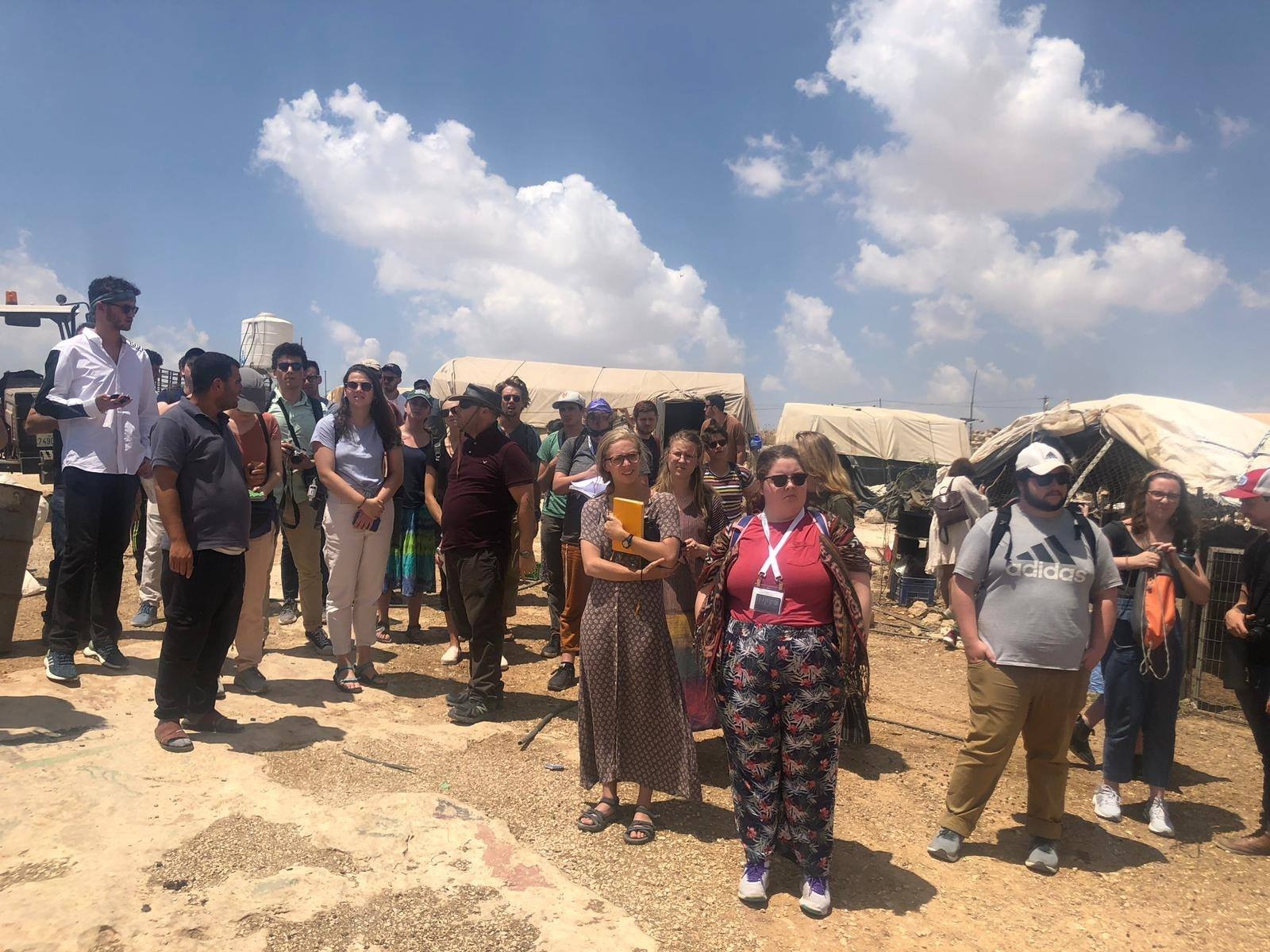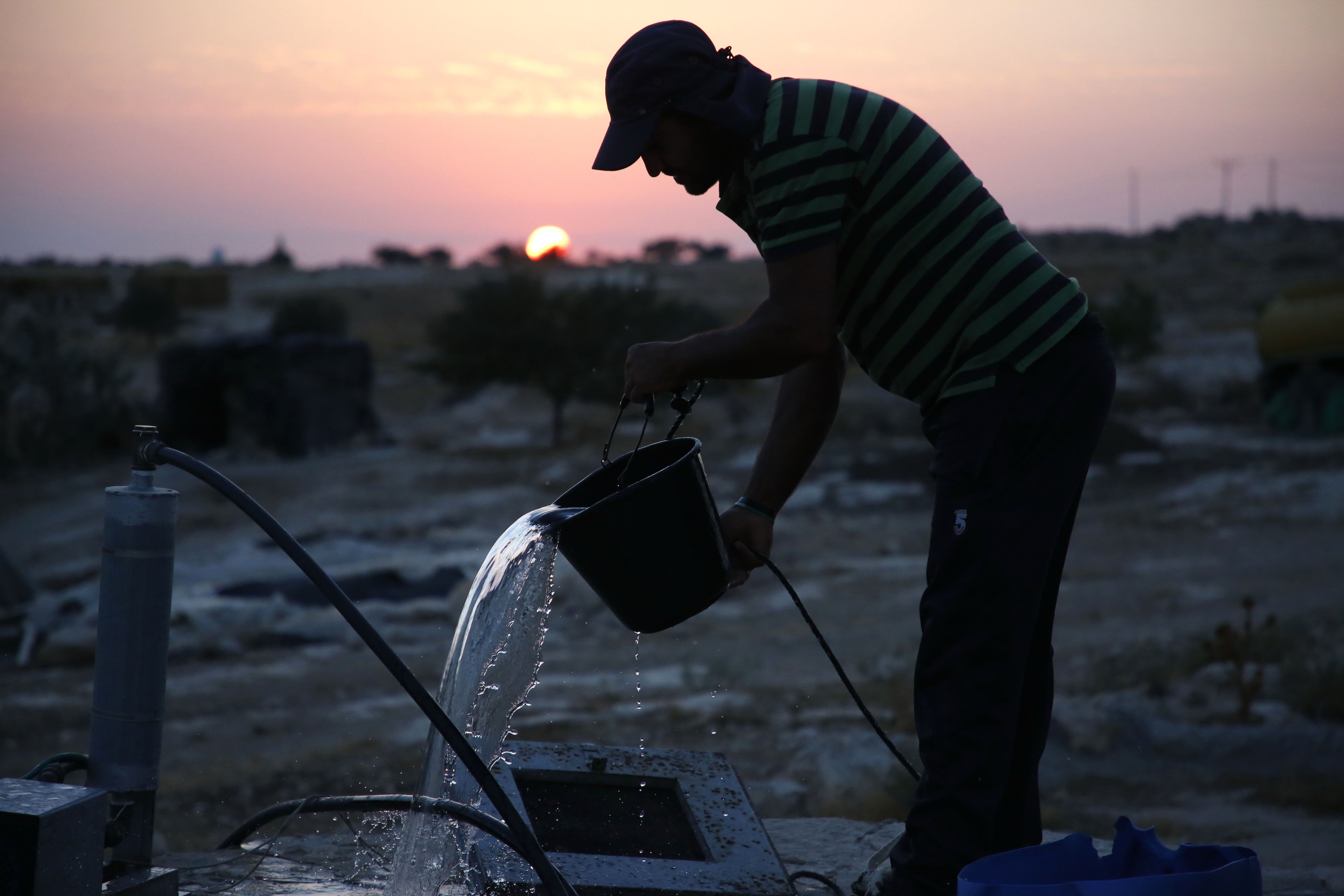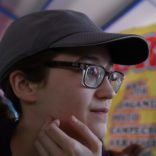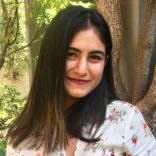3 participants share what they learned on J Street’s first alternative to Birthright trip
Published July 30, 2019
(JTA) – Editor’s Note: In March, the the liberal Israel policy group J Street announced that it would be creating a 10-day free trip to Israel, designed to provide students with both Israeli and Palestinian perspectives on the conflict. Many interpreted the announcement as a move to compete with Birthright Israel’s trips, which have been criticized for not featuring Palestinian voices.
The first trip took place in July. Below, three of the 28 participants share what they experienced. Their responses have been edited for length and clarity.
The conflict is not mine to fix
ADVERTISEMENT
Before I went on J Street’s “Let Our People Know” trip, the Israeli-Palestinian conflict was highly intellectualized in my mind. I could rattle off a few key dates and figures, and I could come up with one or two points of contention for either side, but it seemed abstract.
Now, the conflict is material. It includes faces from Sakhnin and Jerusalem, Ramallah and Netiv HaAsara. It smells like eucalyptus in Tel Dan Park and tastes like tea in a drought-plagued West Bank village. It sounds like an Israeli woman choked up with grief and fear while describing the death of Gazan civilians during Operation Protective Edge, an American-accented settler calling the West Bank his ancestral land and a Palestinian man describing his ideals of nonviolence and community education.
However, at the end of the day, the conflict is not mine to fix. I am a Jewish American, and my Judaism does not give me a blank check to speak over Israelis or Palestinians. The crux of what I have learned is that Israelis and Palestinians deserve more than American saviors who tokenize and simplify them.
In America, I have seen Zionism and even Judaism itself attacked as inextricably colonialist, even to the point of misguidedly supporting Hamas. I’ve seen careless disregard for Arab lives, the elimination of Palestinians from our dialogue and the dismissal of pro-peace activism. This binary limits our ability to recognize the real-life subtleties of the conflict and discuss them in any meaningful way.
ADVERTISEMENT
Our trip examined some of those subtleties. I learned about false historical narratives that infantilize and minimize the role of Mizrahi and Sephardi Jews in Zionist history, as well as Israel’s continued colorism against that community. I also learned about the continued suffering of Gazans under both Hamas and the blockade and the struggle of West Bank Palestinians who are faced with the occupation as well as corruption within the Palestinian Authority.
At a panel in East Jerusalem, a Palestinian man looked askance at our group and stated that he bears no hatred for Jews. He was afraid we wouldn’t listen to him because we would associate his criticisms with anti-Semitism. I refuse to be the type of Jew that man fears. It wounded me deeply to know that many in my own community might be so wrapped up in their own political ideologies that they would deny him his voice.
As I left Israel, I knew that our trip was likely to be smeared as anti-Israel and anti-Zionist by some on the right, and as a colonialist, Zionist propaganda exercise by others on the left. It was neither.
I won’t pretend I can understand the shared history and emotions of two peoples after such a short trip, but I see that I didn’t know enough before and I don’t know enough now. Starting conversations begins with admitting ignorance and seeking to understand that which we do not. Education is crucial in fighting despair and inertia.
– Elyse Endlich

Participants on J Street’s first “Let My People Know” trip in the village of Susya, south of Hebron in the West Bank, July 2019. (Courtesy of J Street)
Palestinians need to be heard, too
Prior to going on this trip, I had limited experience in discourse around the conflict.
At my university, most of the Jewish population was extremely secularized and stayed away from Israeli politics because it’s viewed as too complicated. The conversations I witnessed in person and even on social media were dominated by Americans – often non-Jews – who are very opinionated about Israel in regard to what it meant for the United States.
On the far-left, there were those who had taken on a savior role for Palestinians. However, they weren’t genuinely concerned about solutions that could allow Palestinians to gain equal rights. They were simply using Israel to express another grievance on how America was causing destruction in the world by supporting the creation of a “white supremacist, fascist” country.
On the right were individuals who whose conversations about Israel are based on the premise that any criticism of Israel is anti-Semitic. They used identity politics to divide the opposing party as well as to create unnecessary discord to distract from the real issues about the conflict.
The Let Our People Know Trip allowed me to gain that personal understanding that I had been looking for. We met with a diverse set of panelists, speakers and activists who each had a unique story to tell and messages they wanted to deliver to the world.
At a meeting with a Palestinian who lived in Susya, a village located in the West Bank, we learned that the Israeli government had demolished homes within the village to make room for an Israeli archaeological site. Not only did individuals lose their homes, but they could not obtain permits to build new ones elsewhere. The archaeological site blocked the citizens’ water cisterns, meaning that they had no access to water. They now must rely on the IDF soldiers to bring them a daily supply, and if they don’t come, then they are forced to go without.
It was difficult to see the checkpoints, the separate quarters, the torn-down buildings and the heavy presence of the IDF soldiers. However, living through it is far more difficult than seeing it. The Palestinians gave me a lesson on what it means to have strength through adversity. By not paying attention to Palestinians and what they’re saying, we are also not paying attention to the real problems that the Israeli government has created for them.
As an American Jewish individual, I acknowledge the privilege I have in this situation. I want Israel to be a place that represents all Jewish people, but not at the expense of other groups. Because of the opportunity that J Street provided to me with this trip, I now have the knowledge to help change the way dialogue is happening around the occupation and to begin working towards real solutions.
Palestinians don’t need people to find their voice for them. Palestinians have a voice, but they need to have an audience that listens. I call upon myself and other Americans to be that audience and help share their message.”
– Liyah Foye

A Palestinian shepherd uses a bucket to get water from a well in the village of Susya, Aug. 19, 2017. (Hazem Bader/AFP/Getty Images)
Reclaiming the Jewish narrative
J Street called its trip a kind of “alternative Birthright,” but Birthright this was not. It’s actually far better: Let Our People Know is doing the crucial work of building a progressive Judaism that is deliberate in its political stakes. The trip challenged Birthright’s pretense of being apolitical, instead providing space for young American Jews to wrestle with our moral responsibility.
On my Birthright trip three summers ago, none of the participants knelt beside huts made of straw bales, overcome with despair at the sight of the water-starved village that’s been resisting Israeli demolition orders since 1986. Nobody walked in stunned silence through the post-apocalyptic streets of Hebron, where severe restrictions on movement have shuttered most Palestinian storefronts. Nor do I think that many of the 18- to 21-year-olds on my Birthright trip — most of whom thought of it primarily as a vacation — would have welcomed such exposure to the difficult realities of the Israeli occupation.
Etan Nechin wrote in The Forward that because the Let Our People Know trip frames the occupation through the lens of Jewish values, it centers Jewish people in anti-occupation work rather than empowering Palestinians. On the one hand, this accusation of narcissism makes me laugh: Many of the trip’s participants engage with J Street at the cost of painful alienation from our more right-wing Jewish communities. But Nechin is correct that Let Our People Know is a conscious attempt to reclaim and transform the Judaism that underpins establishment narratives about Israel. The pilot trip is J Street’s self-conscious attempt to help bend the moral arc of Judaism toward justice. More than anything else in this nightmarish conflict, this ambition gives me hope.
If “into Israel” encompasses a commitment to ensuring the state is something we’re proud to be associated with as American Jews, J Street succeeded and then some. Our people’s need to know is less about the occupation per se, and more about the need to organize the Jewish voice against it — and against an establishment that takes an amorphous, apolitical Jewish connection to Israel for granted.
– Gabriella Kamran

is a rising sophomore at Pitzer College.

is a 19 year old senior at the University of North Carolina Asheville and will graduate in December 2019 with her Bachelors of Arts in Religious Studies and minor in Women and Gender Studies. She is a former Founders Fellow with the Hebrew Union College and a co-founder of the Jews of Colors Caucus for Carolina Jews for Justice. She is passionate about pro-peace, pro two-state solution activism and is a proud Jewish Woman of Color.

is a UCLA graduate and rising JD candidate at UCLA law.














